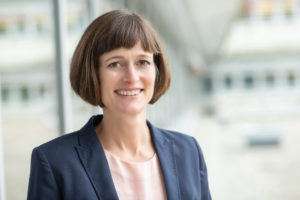June 5th, 2023
Two million euros for research on organic electrode materials: Professor Birgit Esser receives Consolidator Grant. The chemist Prof. Birgit Esser from the Institute for Organic Chemistry II and New Materials at the University of Ulm has received a Consolidator Grant from the European Research Council (ERC) of two million euros for five years for her project “NanOBatt”. The researcher is also an associated research group leader at the Helmholtz Institute Ulm (HIU). Organic electrode materials (OEM) for next-generation batteries are to be researched with NanOBatt. The focus will be on improving OEM porosity, thereby facilitating ion diffusion. OEM have many advantages: they consist of widely available elements, are accessible with a low carbon footprint and can be easily recycled. The ERC Consolidator Grant aims to strengthen outstanding scientists in expanding their working groups and promote international visibility.
Glückwunsch an Prof. Birgit Esser @Besserchemistry: Die Chemikerin der #uulm erhält einen Consolidator Grant des @ERC_Research in Höhe von 2 Mio. Euro! ?Im Projekt ?NanOBatt?erforscht sie organische Elektrodenmaterialien für Batterien. https://t.co/6sy5PZbVlm *cl/?Eberhardt pic.twitter.com/zwVcIOETzr
— Universität Ulm (@uni_ulm) June 5, 2023
Be it smartphones or electric cars, wireless headphones or robotic lawn mowers: batteries are in many electrical devices. And the demand for it keeps increasing. New energy storage solutions are needed. With her NanoBatt project, Prof. Birgit Esser wants to research a fundamentally new concept for organic electrode materials. The chemist combines the necessary expertise in organic synthesis chemistry with know-how from the field of organic battery electrode materials in a unique way. With its holistic approach, Esser wants to close the gap between basic research and the application of organic materials.
Improve porosity of organic materials
“Compared to inorganic materials for batteries, the field of OEMs has been significantly less researched,” says Esser. The problem: Existing OEMs have poor porosity, which impedes the diffusion of counterions to electroactive sites or makes redox processes, i.e. the simultaneous loss or acceptance of electrons, irreversible. This severely limits their performance and applicability. In order to improve the porosity of the organic materials, Esser relies on so-called redox-active, conjugated nanohoops with NanOBatt. These are hoop-shaped molecules whose electrons do not stay at a fixed point but move within the hoop. “That could be an advantage and stabilize the charge,” explains the chemist. The aim of NanOBatt is to produce such nanohoops, the synthesis of which is sometimes very complex. The basis for this should be, for example, quinones or azines – chemicals that are currently obtained from crude oil. “In the long term, you can see whether you can use renewable raw materials for this,” says Esser. The challenge here is to store as much charge as possible on as few molecules as possible. Because: “Ideally, you want a battery that weighs as little as possible and has a lot of storage capacity,” says Esser. This is one of the reasons why high porosity is important: it enables thicker electrodes, which lead to higher capacitance – the prerequisite for less material on the charge collector.

In order to see whether the porosity improves, methods are also to be established in NanOBatt with which the effect can actually be measured in interaction with other materials in batteries. “The methods commonly used do not work in this context,” says Esser. Finally, selected, redox-active nanohoops will be investigated as OEM in alternative battery cell configurations: in sodium, aluminium, magnesium and purely organic batteries.
Prof. Birgit Esser moved from the University of Freiburg to the University of Ulm in 2022. Before that she did research at the University of Bonn and at MIT in the USA. Esser studied and received his doctorate in Heidelberg. It is a member of the POLiS cluster of excellence (Post Lithium Storage Cluster of Excellence), where scientists develop new battery materials and technology concepts for efficient and sustainable storage of electrical energy. Esser is also a member of the CELEST research platform and associated group leader at the Helmholtz Institute in Ulm.
About the ERC Consolidator Grant
ERC Consolidator Grants are aimed at excellent researchers in the consolidation phase. The funding is primarily intended to support them in expanding their independent working group and increasing their international visibility. Typically, promising scientists from all disciplines apply seven to twelve years after their doctorate. An international jury, advised by external experts, decides on the quality of the applications submitted. The selected researchers receive up to two million euros for five years for their projects. In 2022, 2222 applications were submitted. Of these, 321 researchers from 21 countries were selected for an ERC Consolidator Grant. The only criterion is the scientific excellence of the researchers and the proposed project.
Further Information:
Prof. Birgit Esser, Institute for Organic Chemistry II and New Materials, Email: birgit.esser@uni-ulm.de, Group Website: www.esserlab.com
Text and Media Contact:
Christine Liebhardt
Photos: Elvira Eberhardt




